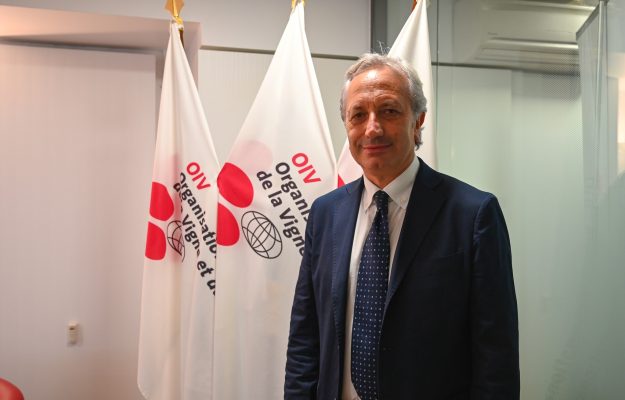Forty years after the presidency of professor Mario Fregoni, the only Italian to have chaired the OIV besides Pier Giovanni Garoglio, Italy is back to lead the Organisation Internationale de la Vigne et du Vin, the UN of wine, with Luigi Moio, professor of enology at the Department of Agriculture of the University of Naples Federico II, producer with the winery Quintodecimo, in Irpinia, new president of the OIV. At WineNews, the value and the weight of an apex role in the politics of world wine, but also the next challenges that await wine and Luigi Moio himself, from a political, agricultural, normative and economic point of view, with many challenges on the table and some knots to untie, starting from the Champagne dispute between Russia and France, passing through the much bigger, not to say impassable, one concerning the fight against climate change and increasingly sustainable viticulture.
“Italy, like France and Spain, has always actively participated in the work of the OIV, with an important delegation of experts, making a very important contribution. The presidency means being at the apex, or rather returning to it, forty years after Professor Fregoni. It is important to find consensus, balance and harmony - remembers Luigi Moio - because the fundamental objective of the OIV is to put the different countries in harmony and make them converge on common rules, which is particularly important if we talk about international trade, just look at what is happening in Russia with Champagne. Going back to the elections, mine was almost a natural candidacy, the final act of a 25-year-long commitment within the OIV, in front of the Australian candidate, who had the support of the countries of the Southern Hemisphere, but not Uruguay. It was tough, but after the first vote I had the support of 28 countries, the majority, which became absolute (two thirds plus one, in terms of a weighted vote based on annual production, ed) in the following round. It is a beautiful thing, in these cases the years of books, of research at the University pass in front of you, and then it gives great visibility to Italy, and this is a pleasure”.
At the center of his presidency, Professor Luigi Moio will put science, the lighthouse of every OIV initiative, especially when it comes to the challenges to be faced, from climate change to the need for increasingly sustainable viticulture. “Clearly - resumes the professor of Enology of Federico II - I will have to be impartial and neutral because the task of the presidency is to contribute to harmonization and the search for consensus. For me the OIV is the organization of technical and scientific reference, recognized worldwide, it is and will remain a scientific organization, an aspect that I would like to emphasize even more, both in the Congresses and at the level of participation of the various countries. And also because we know what the challenges to be faced in the near future are, they are complex, starting with climate change, which we must solve at a multidisciplinary level, bringing together different and very advanced skills. At the viticultural level, we must continue to make wines of great quality, in the historical places of viticulture, which are the locomotive of world enology. And then, this enormous growth of sensibility towards ecological problems requires a revision of some strategies, in agriculture, in viticulture and in the winery. I am increasingly talking about a light enology, therefore with minimal interventions, but also with a different approach, of respect for the environment, in the construction and management of wineries”.
Another hot topic is the one concerning the normative apparatus regulating the dynamics of wine, particularly delicate when it comes to international trade. “Then, there is the great commitment on regulations, and on all that international trade requires, because another fundamental objective - underlines the president of OIV - is to favor international trade as much as possible, but respecting the traditions, cultures and history of each country. This is the basis of the paradigm of diversity, and it is right that wine should be different and have its own identity, and that, for example, Italian wine should reflect Italy, Georgian wine should reflect Georgia, French wine should reflect France and so on for all the 48 OIV countries. The history of the producing countries must be respected, as well as their traditions. Last point, the change of headquarters: from Paris the OIV will move to Dijon, which had the better of Reims and Bordeaux, thanks to a good project supported by the French government”.
Copyright © 2000/2026
Contatti: info@winenews.it
Seguici anche su Twitter: @WineNewsIt
Seguici anche su Facebook: @winenewsit
Questo articolo è tratto dall'archivio di WineNews - Tutti i diritti riservati - Copyright © 2000/2026







































































































































































































